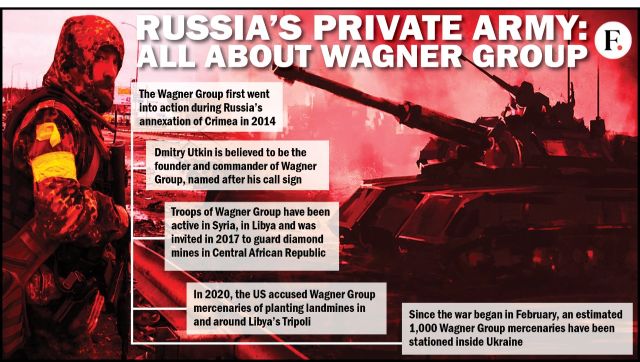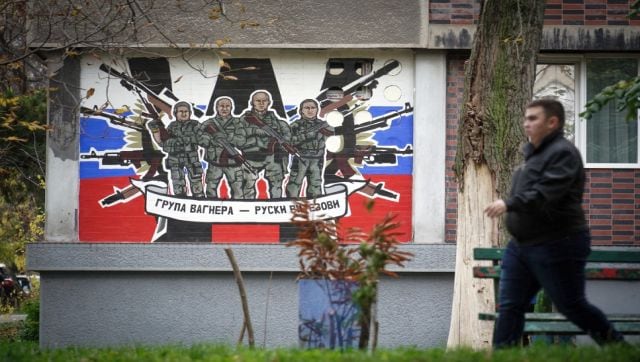The war in Ukraine, now in its 292nd day, shows no signs of abating. On Sunday, reports emerged that Ukrainian forces had struck a hotel where members of Russia’s Wagner mercenary group were based
Luhansk’s exiled Governor Serhiy Haidai was quoted as saying that Ukraine had launched a strike on a hotel in the city of Kadiivka, west of the region’s main centre of Luhansk, causing fatalities. While he didn’t mention the number of casualties, he said, “A huge number of those who were there died. I am sure that at least 50 per cent of those who managed to survive will die before they get medical care.”
As the fighting rages on, we take a closer look at who are these Russian mercenaries, who’s leading them and what role are they playing in the Ukraine war.
What is the Wagner Group?
Believed to be founded in 2014, the Wagner Group consisting of mercenaries is a private military and security company. It has been accused of being used by the Kremlin to carry out covert operations across the world, even though Moscow has denied these allegations.
Investigations reveal that the group was started by 51-year-old former Russian army officer, Dmitri Utkin, whose former call sign is Wagner PMC. It is not confirmed if he founded the group on his own or at the behest of the Russian government.
Utkin, according to a BBC report, is a veteran of the Chechen wars, a former special forces officer and a lieutenant colonel with the GRU, Russia’s military intelligence service.
It is said that Utkin is a neo-Nazi and according to some reports, photos of him had surfaced in March 2021 having three tattoos on his collar bones and chest with logos related to Waffen-SS, a military unit of the SS organisation curated by the German Nazi Party.
Tracey German, professor of conflict and security at King’s College London has been quoted by the BBC as saying that the Wagner Group first went into action during Russia’s annexation of Crimea in 2014.
“Its mercenaries are thought to be some of the ‘little green men’ who occupied the region,” she says in the same BBC report.

Graphic: Pranay Bhardwaj
The Wagner Group mostly comprises of ex-military personnel, in their 30s and 40s, often with criminal histories or hailing from small Russian towns without much work. They have a reputation of being elite fighters, inflicting heavy casualties.
Researcher Isabella Currie at La Trobe University tells Sydney Morning Herald that the group recruits in code. They offer spots to “musicians on tour for the Wagner Conservatory” or, more recently, for “a picnic in Ukraine”. Sometimes they will pose with violins or other musical instruments in photos from the battlefield. “It’s a joke and everyone’s in on it,” Currie says. “It’s just that the joke is terrifying.”
Where have they been active?
A report by the GRID states that Wagner Group has operated in nearly 30 countries, even though they are illegal in Russia.
In the past, the troops from Wagner have been deployed in Syria, Libya, Central African Republic, Mali, Sudan and Mozambique.
In 2015, the Wagner Group fought along with Russian forces and the Bashar al-Assad regime in Syria. As per a Wall Street Journal report, they aided in the seizure of oil and gas fields and secured government infrastructure.
Wagner fighters have participated in Libya’s civil war on behalf of Moscow’s preferred side: the forces led by rebel General Khalifa Haftar, leader of the Libyan National Army.
In both the Central African Republic and Sudan, Wagner has been hired by the government for security services and to guard diamond and gold mines.
Recently, the Wagner Group was also invited by the government of Mali in West Africa to provide security against Islamic militant groups. According to The Washington Post, 800-1,000 Russian mercenaries are stationed in Mali, costing the government $10 million each month. A report in The Guardian said that in March, the Wagner Group was suspected to have been involved in a massacre in Moura (Mali), where 350-380 men were killed.

A pedestrian walks past a mural depicting Russia’s para military mercenaries ‘Wagner Group’ reading : “Wagner Group – Russian knights” on a building’s wall in Belgrade. File pic/AFP
Where does Wagner Group find financing?
Western intelligence agencies have stated that Wagner Group is financed by Russian oligarch Yevgeniy Prigozhin, known as “Putin’s chef” for his lucrative catering contracts with the Kremlin and close ties to the Russian president.
For years, Prigozhin denied any involvement with the mercenary group. However, in September, Prigozhin finally admitted he owned Wagner, having been filmed touring prisons to offer convicts early release in exchange for six months fighting alongside Wagner in Ukraine.
How has Wagner Group contributed to Ukraine war?
Since 2014, the Wagner Group has trained and backed Russian forces. According to a Washington Post report, as of today there are an estimated 1,000 Wagner Group mercenaries stationed in Ukraine.
In the Ukraine war, they have been accused of committing war crimes. They also succeeded on some eastern fronts where the Russian army has failed, helping take Popasna and Lysychansk, though with heavy losses.
Also read: Why is Vladimir Putin’s ‘private army’ recruiting convicts with HIV and Hepatitis?
Defence experts say that since the war in Ukraine began, the Wagner Group has slowly moved out of the shadows and Russian television lauds them as heroes supposedly “helping de-Nazify Ukraine”. “This war has signified Wagner moving out of the shadows and becoming a kind of force in the Russian public consciousness.”
In February as the war broke out, they were also reportedly given orders to assassinate Ukrainian president Volodymyr Zelenskyy.
Many fear that mercenaries such as the Wagner Group could be taken up by more countries down the line too, which would change the nature of war.
With inputs from agencies
Read all the Latest News, Trending News, Cricket News, Bollywood News,
India News and Entertainment News here. Follow us on Facebook, Twitter and Instagram.





